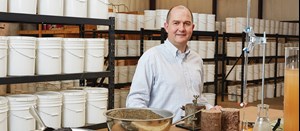Innovative thinkers

Growing up in Longview, Texas, J. Blake Scott was no stranger to the importance of the oil and gas industry. As a high school assignment, he had shadowed one of his father’s former co-workers at Eastman Chemical Company, a major chemical and polymer product manufacturer. The experience left Scott with a firm interest in engineering, and a plan for his future.
With that, he left high school after his junior year and moved overseas, where he attended St. Clare’s College in Oxford, England. Upon completion of the program at St. Clare’s, Scott was accepted to The University of London’s Imperial College of Science, Technology and Medicine. After just six months, however, he decided to return to the U.S., where he finished his BS degree at Texas Christian University (TCU). He went on to earn an MBA degree from TCU, as well.
While finishing his MBA, Scott and his father, Bill Scott, had begun laying the groundwork to form their own company, Scott Environmental Services, Inc. From their own experiences in the manufacturing business, Scott and his father saw an opportunity to revolutionize the industry’s approach to waste management. Scott said, “We realized there might be other avenues to handle waste from a more scientific perspective.”
The expansion of horizontal drilling and multi-well drilling pads has generated considerable challenges in the treatment of solid drilling waste, including increased environmental concerns. The current volume of solids being turned out in the U.S., alone, is staggering. As a result, the industry is looking continuously for new ways to handle it. Scott said, “We decided that handling waste through stabilization/solidification was the most practical and sustainable means.”
Scott established a company that recycles, treats and disposes of drilling waste and drill cuttings, while reducing the liability, cost and environmental footprint of its clients. Traditionally, solids are buried or placed in a landfill, but Scott saw an opportunity to reuse the waste in the industry’s construction sector.
He worked to develop advanced technologies that would improve on established methods of solidification and stabilization, which would sequester contaminants and make them insoluble. Through this technology and sophisticated technique, a product resembling concrete is produced and used for building lease roads and drill pads capable of supporting heavy loads from solid drilling waste.
The proprietary technologies used for this recycling process are supplied by Firmus, and the onsite treatment process is provided by Duro. Scott developed each process over the course of several years. During that time, he designed them to include the engineering for waste disposition and pit closure, the work to recycle the waste, and the confirmatory testing of the recycled material after placement. The processes are specifically for use on freshwater mud and cuttings, and oil-based mud and cuttings, as well as some saltwater mud and cuttings.
In essence, the processes take waste that is ordinarily disposed of, and recycle it to create structures that would otherwise need new, raw materials to build. “From an oil and gas perspective, we’ve found these to be the most sustainable methods of waste management,” Scott said. “We need to utilize the resources that we have.”
A pioneer in several areas of environmental science, Scott has several U.S., Canadian and Mexican patents, but continues to serve diligently as his company’s founder and president. Since it was founded in 1994, Scott Environmental Services continues to expand, and today holds permits to operate in various states throughout the U.S. ![]()
- Coiled tubing drilling’s role in the energy transition (March 2024)
- Digital tool kit enhances real-time decision-making to improve drilling efficiency and performance (February 2024)
- E&P outside the U.S. maintains a disciplined pace (February 2024)
- Prices and governmental policies combine to stymie Canadian upstream growth (February 2024)
- U.S. operators reduce activity as crude prices plunge (February 2024)
- U.S. producing gas wells increase despite low prices (February 2024)


